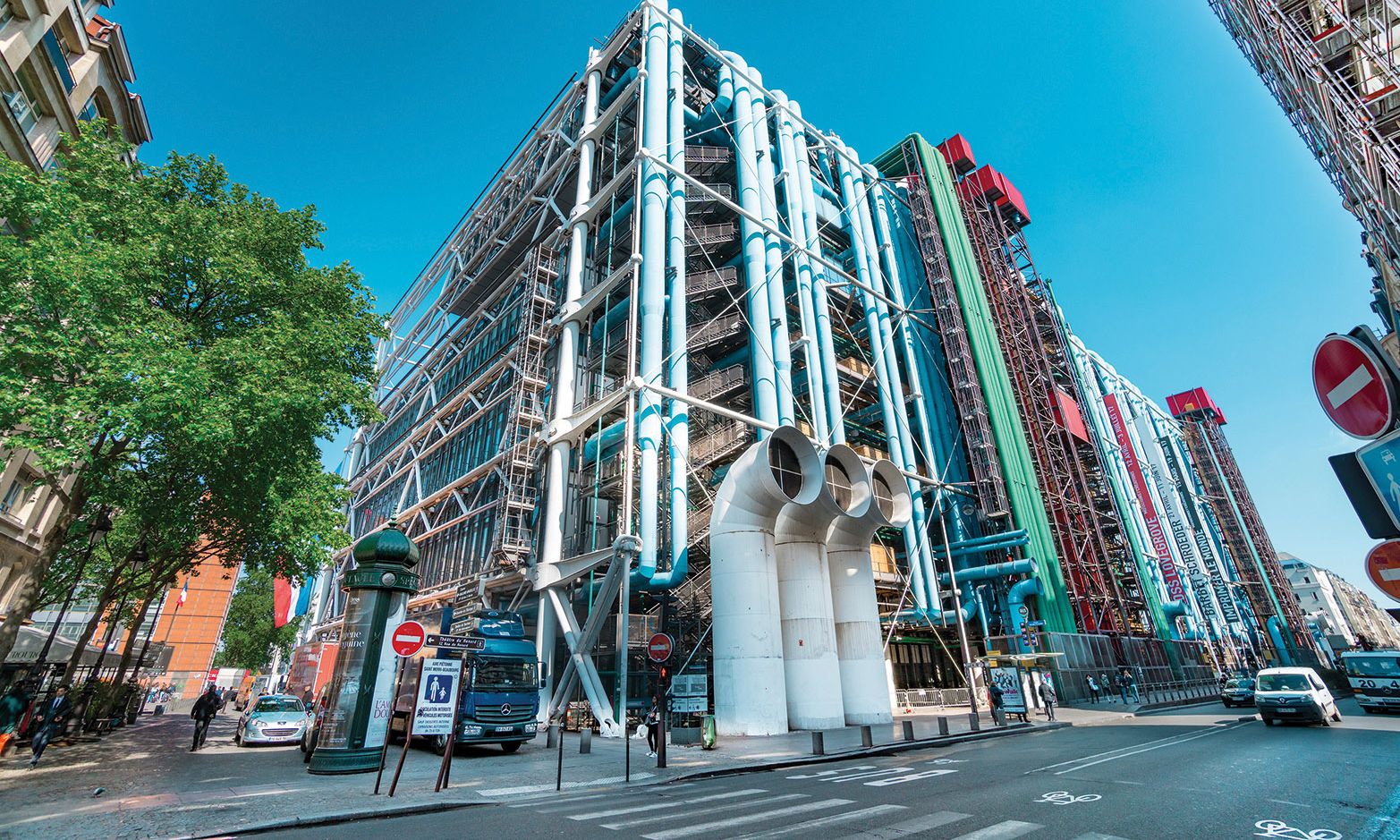A museum in turmoil: the Pompidou is due to close from 2025 until 2030. Fearing for their job security, staff have staged a series of strikes since mid-October, causing the building to close for eight days Zefart
The Centre Pompidou is in turmoil following repeated staff strikes over plans to close it for refurbishment for five years from 2025.
The Paris arts complex, home to France’s national museum of Modern and contemporary art, is scheduled to start removals and partial closures in autumn 2024 for a massive €262m renovation. The building will shut down completely at the end of 2025 and not reopen before 2030.
Pompidou staff members have staged multiple strikes over job security concerns since mid-October, causing the building to be closed for eight days. On 14 November, talks stalled between the five trade unions and the French culture ministry, which stepped in to handle negotiations. As we went to press, more than 2,200 people had signed a petition launched by the unions claiming the Pompidou is “in jeopardy”. Two left-wing MPs attended the strikers’ assembly promising to raise their concerns to parliament.
Pompidou president Laurent Le Bon has not yet revealed the reopening programme © Didier Plowy/Centre Pompidou
The unions say that in the three years since the decision was taken to close the museum for renovations, staff have received no “written guarantees concerning their professional future”. A Pompidou spokesperson tells The Art Newspaper that “all employees will be maintained and recover their posts or an equivalent at the reopening”.
The unions are calling for “the maintenance of the workforce”, which includes more than 1,000 current employees. They also expect a commitment that no jobs will be outsourced, a move that could weaken their leverage. For example, most of the security staff at the Louvre and the Musée d’Orsay are now outsourced, making union action more difficult. But a source close to the culture minister Rima Abdul Malak tells The Art Newspaper it is “absolutely impossible to make such detailed commitments seven years in advance”.
Another key union demand is the “maintenance of all the museum’s activities and missions in a single dedicated location” during the closure. “There is no way we could find a site in the heart of Paris” that could substitute for the 120,000 sq. m occupied by the Pompidou, says the same official source. However, he adds, the Pompidou is in the process of establishing a partnership to host exhibitions from its collection until 2030 at the Grand Palais, which is due to reopen in 2024 after its complete refurbishment.
Changes to the Pompidou’s planned overhaul have stoked the conflict with the unions. In January 2021, the then French culture minister Roselyne Bachelot announced that the centre would close for three years for a €200m renovation. A complete closure was required to limit the costs and time required to modernise an ageing building, she said, including asbestos removal, insulation and disability access. The project includes replacing the fire safety and air-conditioning systems as well as the lifts, escalators and bay windows.
However, the three-year time line has now become five and the budget has ballooned to €262m. The Pompidou has cited the rising costs of public works. In addition, the institution still has to fundraise €160m for the reorganisation of its galleries and cultural spaces. But Laurent Le Bon, the Pompidou president, has yet to present his cultural programme for the reopening of the museum in 2030, so the unions argue that the impact of the works on the galleries remains unclear. The Pompidou promises the reopening programme will be finalised by June 2024.
Appointed in 2021 for a five-year term, Le Bon succeeded in delaying the closure until after the 2024 Olympic Games, when Paris is expected to welcome more than 16 million visitors. He promises to “preserve the DNA of the Centre Pompidou”, which was conceived as a multidisciplinary cultural hub, including a museum, a public library and a musical research centre.
The French government is adamant that there is no alternative to a full shutdown for the renovation, which is critically needed and long overdue. A former Pompidou president, Alain Seban, disagrees and told Le Journal des Arts he “would have chained himself to the gates of the [culture] ministry to avoid a complete closure”. Keeping the building partially open “would have significantly raised the costs and the duration of the works, not to mention the considerable negative impact on visitors and staff”, the ministry responded.

